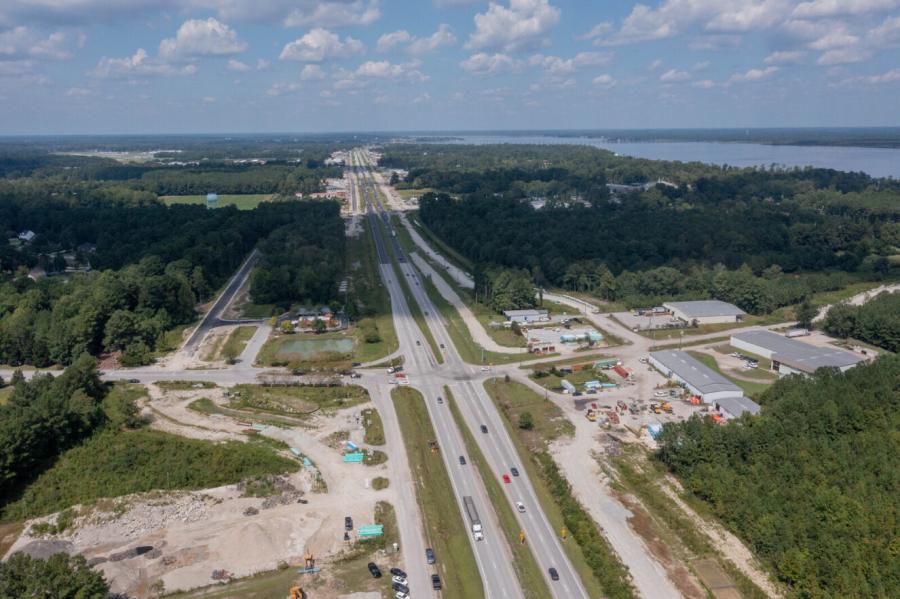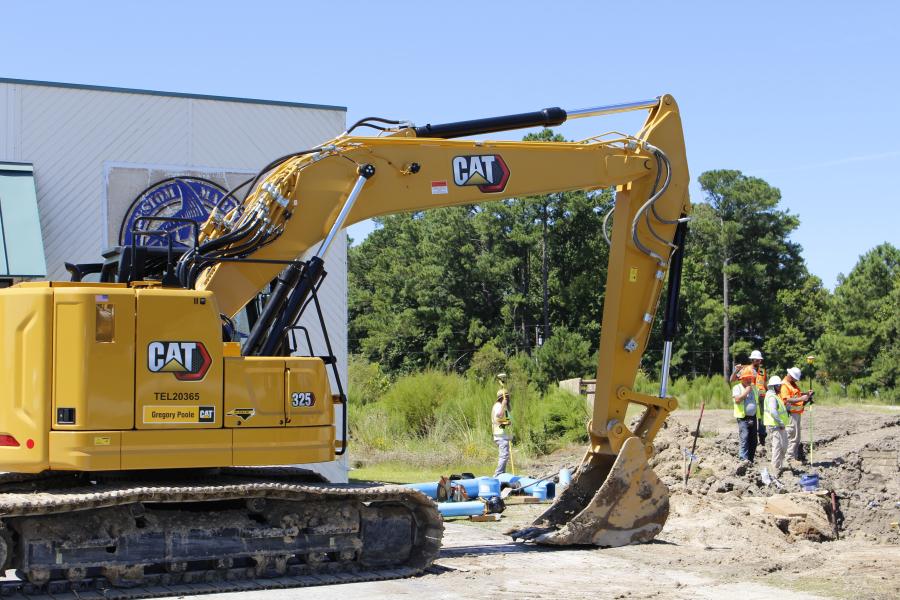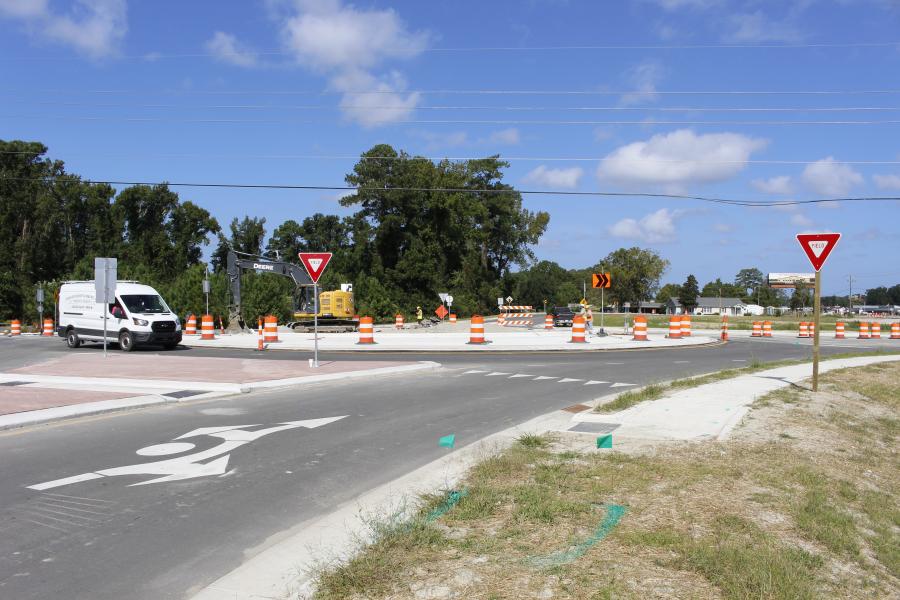Construction will cost $234 million, with the final price tag at $322 million
(North Carolina DOT photo)
U.S. 70 in North Carolina is growing up; it is destined to become Interstate 42 in the next few years. Becoming a grown-up means added responsibility. This is true for roads just as it is for individuals.
U.S. 70 is already interstate caliber from Dover to New Bern. North Carolina Department of Transportation (NCDOT) has plans for U.S. 70 to become an interstate, carrying traffic to beach areas, military installations and Morehead City.
Morehead City is one of two ports in North Carolina, receiving massive cargo ships traveling through the Panama Canal. In addition to ferrying goods from the port to various regions of the state, the upgraded highway will help service a Marine Corps Air Station and Coastal Carolina Regional Airport. Military bases in Goldsboro and Havelock also will be affected by the new interstate quality roads. In addition, semi-rural areas of the eastern part of the state will have greater access for travel and economic activity.
In decades past, a new interstate would plow through new territory, while this upgrade will snake through business and residential areas in James City just outside New Bern.
The James City section of the upgraded freeway is a 5-mi. piece of U.S. 70 that carries several challenges. The road is bordered on the north by the Neuse River and to the south by a busy railroad which precluded interruption for highway construction.
Threading an upgraded road through a nest of businesses and residences has fallen to resident engineer Wendi Johnson and contractor Balfour Beatty. The contractor also will be responsible for building another section of the upgraded U.S. 70 (future I-42), the Havelock Bypass. The James City section of U.S. 70 is a design-build project planned for completion in late 2025. Construction will cost $234 million, with the final price tag at $322 million.
Relocating utilities began in 2020 with project planners needing also to relocate some 40 businesses and 17 homes.
"We have to build this project from the outside in," said Johnson, project engineer of the job. "Rather than working on the heart of the project first, upgrading 70 to interstate standards, we have had to rebuild and relocate service roads first so we would have places to reroute traffic for construction.
Of course, workers needed to relocate numerous utilities, which has been time consuming. Utilities have included water, sewer, power and fiber optics from multiple communities. The construction team has installed waterlines in 12-in. diameter pipes and other utilities in 8-in. diameter pipes. Construction workers are digging the trenches for these pipes on both sides of the new road.
Safety will be an important consideration for the upgraded highway.
"The Craven County Sheriff's office has told us that his staff have had to respond to more accidents in this corridor than anywhere else in Craven County," said Johnson. "The new road will be a combination of median with barrier and a grass median and guardrails. The elimination of four signalized intersections — five at grade intersections — replacing them with off ramps and on ramps."
Motorists traveling U.S. 70 toward the coast travel some 40 mi. at interstate speeds. They are then confronted with these four signalized intersections, which slow down traffic and can result in accidents. When construction is complete, drivers will pass over these intersections and proceed toward their destinations.
The finished road will be asphalt with a portion of the old road remaining as part of the four-lane design.
Unique Challenges, Unique Solutions
One unique challenge is that the ground where the new lanes will go is exceptionally soft. A traditional approach is to lay the rock subgrade where the new lanes are designed, allow the ground to settle for a period of months, then continue the build. NCDOT and the contractor decided on a different approach, one that would bring the project to the finish line months earlier.
"The contractor decided to use 250,000 cubic yards of light-weight cellular concrete," said Johnson. "This substance uses cement and combines it with water, fly ash and a foaming agent to make a product almost like light weight cement blocks. It has the same strength as fill dirt but is much lighter. The cellular concrete approach should greatly reduce the waiting time for the next step of construction."
Less weight and less time means nearly 75 percent fewer truck trips carrying road building materials. A concrete batch plant on site also adds to convenience and eliminates more truck traffic, lessening the project's carbon footprint even further.
"This will be the largest cellular concrete project on the East Coast," said Johnson. "Its use is an innovative way to work with the highly compressible soils in this area. The cellular concrete will be produced onsite and deposited with hoses."
While most road construction projects are done during the summer, the U.S. 70 work needed to be done carefully, considering the heavy beach traffic in the summer.
"This road is the only path to some of the beaches," said Johnson. "We were required to maintain two lanes in each direction and were limited to what we could do during the weekends. Contractors were limited to night work during that time."
The next section, approximately 5 mi., also will be design build.
"Working with our team on U.S. 70 has been enjoyable," said Johnson. "It is a memorable project that will make a difference in a lot of people's lives." CEG
Chuck MacDonald
Chuck MacDonald is an editor, blogger and freelance feature writer whose writing adventures have taken him to 48 states and 10 countries. He has been the editor for magazines on pavement construction, chemicals, insurance and missions. Chuck enjoys bicycling, kayaking and reading. He graduated from the University of Missouri with a degree in journalism. Chuck lives in Annapolis, Md. with his wife Kristen. They have seven grandchildren.
Read more from Chuck MacDonald here.
Today's top stories






















